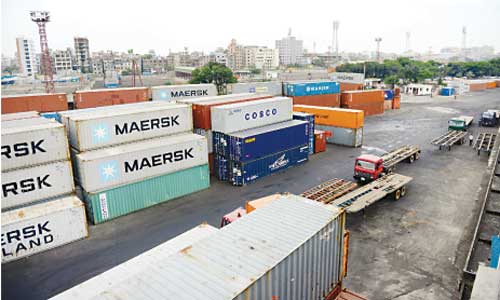The National Board of Revenue has put a bar on providing freight forwarding licence to fully foreign-owned companies to operate in the country.
The revenue board has imposed the restriction through amending the existing Freight Forwarders (Licensing and Operations) Rules-2008 to promote domestic companies.
It also reduced the percentage of share of foreigners in a joint venture company to 40 per cent from the existing 49 per cent as criteria for getting freight forwarder licence under joint venture initiative.
The revenue board on July 1 issued a statutory regulatory order in this connection.
Officials of the NBR said that they brought the changes in the rules as a move to promote domestic companies and restrict foreign companies in services sectors in the country in line with the demand of the local freight forwarders.
There is also an instruction of the High Court for not providing such license to any foreign companies.
Bangladesh Freight Forwarders Association also welcomed the decision of the revenue board saying that it will benefit the domestic companies and help them in expansion of their business.
Currently, there are a total of 878 freight forwarders—companies which engaged in total transportation of the goods in international trade by sea, land and air or combined multimodal transportation and other related services—having licenses from the customs authorities working in the country.
Of them, around 30 companies either are fully foreign-owned or have foreign investment.
Some multinational companies including DHL, FedEx, EXPO, Marsline, NYK line are operating freight forwarding business in Bangladesh.
Currently, fully foreign freight forwarders can get license by only bringing worth Tk 1 crore equivalent of foreign currencies in the country as investment and providing bank guarantee of US$ 5 lakh in favour of customs authorities.
According to the rules, freight forwarders are engaged in commercial transportation of export-import goods and deliver those to the exporters’ and importers’ place.
Freight forwarders said that they could also engage in other related services like packing, warehousing, space booking, export-import documentation, container freight station operation, cargo agents, customs brokerage and all other functions related to logistic service and supply chain management.
BAFFA president Mahbubul Anam said that the government took the decision in line with the practices in the neighboring countries including India and Sri Lanka to
protect the interest of local companies.
There was a general consensus among all stakeholders on promoting local firms if there are no benefits of high technology and knowledge transfer by the foreign companies, he said.
BAFFA vice-president ABM Rafiquz Zaman said that foreign companies established a monopoly business in the sector taking the advantage of good relationship with foreign buyers and their establishments in many countries.
Though there was a condition of possessing the highest 49 per cent of share by the foreign partners of a joint venture company, in most cases, they own almost full share depriving the local partners, he claimed.
BAFFA has been demanding for not providing any further freight forwarders license to any foreign companies to promote and protect the interest of local firms as a few hundred local entrepreneurs have entered in the business taking the advantage of the country’s huge volume of export, he said.
He said that the revenue board, however, did not make it clear if the license of the existing foreign companies will be renewed after the existing terms.
A customs official however said that existing foreign freight forwarding companies will be allowed to renew license to continue their operation.
The revenue board has also increased the terms of the license for the freight forwarding companies to 4 years from the existing 2 years.
The revenue board has imposed the restriction through amending the existing Freight Forwarders (Licensing and Operations) Rules-2008 to promote domestic companies.
It also reduced the percentage of share of foreigners in a joint venture company to 40 per cent from the existing 49 per cent as criteria for getting freight forwarder licence under joint venture initiative.
The revenue board on July 1 issued a statutory regulatory order in this connection.
Officials of the NBR said that they brought the changes in the rules as a move to promote domestic companies and restrict foreign companies in services sectors in the country in line with the demand of the local freight forwarders.
There is also an instruction of the High Court for not providing such license to any foreign companies.
Bangladesh Freight Forwarders Association also welcomed the decision of the revenue board saying that it will benefit the domestic companies and help them in expansion of their business.
Currently, there are a total of 878 freight forwarders—companies which engaged in total transportation of the goods in international trade by sea, land and air or combined multimodal transportation and other related services—having licenses from the customs authorities working in the country.
Of them, around 30 companies either are fully foreign-owned or have foreign investment.
Some multinational companies including DHL, FedEx, EXPO, Marsline, NYK line are operating freight forwarding business in Bangladesh.
Currently, fully foreign freight forwarders can get license by only bringing worth Tk 1 crore equivalent of foreign currencies in the country as investment and providing bank guarantee of US$ 5 lakh in favour of customs authorities.
According to the rules, freight forwarders are engaged in commercial transportation of export-import goods and deliver those to the exporters’ and importers’ place.
Freight forwarders said that they could also engage in other related services like packing, warehousing, space booking, export-import documentation, container freight station operation, cargo agents, customs brokerage and all other functions related to logistic service and supply chain management.
BAFFA president Mahbubul Anam said that the government took the decision in line with the practices in the neighboring countries including India and Sri Lanka to
protect the interest of local companies.
There was a general consensus among all stakeholders on promoting local firms if there are no benefits of high technology and knowledge transfer by the foreign companies, he said.
BAFFA vice-president ABM Rafiquz Zaman said that foreign companies established a monopoly business in the sector taking the advantage of good relationship with foreign buyers and their establishments in many countries.
Though there was a condition of possessing the highest 49 per cent of share by the foreign partners of a joint venture company, in most cases, they own almost full share depriving the local partners, he claimed.
BAFFA has been demanding for not providing any further freight forwarders license to any foreign companies to promote and protect the interest of local firms as a few hundred local entrepreneurs have entered in the business taking the advantage of the country’s huge volume of export, he said.
He said that the revenue board, however, did not make it clear if the license of the existing foreign companies will be renewed after the existing terms.
A customs official however said that existing foreign freight forwarding companies will be allowed to renew license to continue their operation.
The revenue board has also increased the terms of the license for the freight forwarding companies to 4 years from the existing 2 years.
Source: New Age










